By Courtney Sudbrink
(Oct/Nov 2012/vol. 5 – Issue 5)
Like just about any other day in Santa Monica, Calif., the sun is shining and the Spanish palms are standing tall. There’s a cool, moist breeze and a salt smell in the air.
A few blocks east of the ocean, situated next to a hacienda-style building, there’s a concrete complex with blue awnings that looks like a house in comparison to the Wilshire high-rises half a mile down the street. Scan the directory sign out front, and you’ll see a listing and suite number for “Axster-Bingham” — marking the otherwise unassuming building as the headquarters for Grammy and Academy Award-winning artist Ryan Bingham’s brand new record label.
Finding the suite itself is like a trip through a maze; it takes a walk down a confusing back alleyway to finally arrive at the tiny boutique office that turns out to have a lot more of a Main Street mom-and-pop than high-powered Hollywood vibe. The bookshelf in the entryway has a few vinyl copies of Bingham’s 2007 ablum, Mescalito, but that’s the only evidence of his career currently displayed in the office. When Bingham and his writer-director wife, Anna Axster, greet me, it’s in the manner of a young couple welcoming someone into a new house that they’re still in the process of decorating. A black and white, shiny coated dog running happily around the barely furnished digs completes the domestic portrait.
Onstage and in his publicity shots, Bingham looks every inch the brooding, Townes Van Zandt-type character conveyed by his music. And in the wake of the sweeping success of “The Weary Kind,” his theme song for the 2009 film Crazy Heart, both Bingham and Axster have dressed up for their fair share of red carpet walks into the Golden Globes, Oscars, and Grammys. But today they couldn’t appear more ordinary. She’s a pretty, girl-next-door-looking blonde, and he’s a boyishly handsome dude of 31 who could pass for 25, with a scruffy beard and greasy brown hair parted down the middle. He’s thin and a little tattered, wearing an old t-shirt and worn-out jeans, but there’s no perceptible darkness about him at all — let alone any hint of the “Weary Kind” vibe of Bad Blake, the jaded and burned-out country singer played by Jeff Bridges in Crazy Heart. If anything, Bingham radiates an air of gentle politeness and laid-back chill, like a happily married man who seemingly couldn’t be more at ease or optimistic to be back at the DIY wheel of his career. After a three-record run on the Mercury Nashville imprint Lost Highway, Bingham and his wife are releasing his aptly titled new album, Tomorrowland, as a family effort.
“The way the record business is going right now, it’s really more accessible for bands and artists like me to be able to do stuff on our own,” explains Bingham. “We had a really good relationship with the folks at Lost Highway, but my wife and I were already doing the management stuff together and we were just at a point where we could do it on our own, so it just made sense to do it.”
Axster’s been at his side since before his breakout success. Back when Bingham was still struggling as a relative unknown, he played a gig in L.A. that Axster’s roommate happened to catch. The roommate brought home a demo Bingham was hawking at the time, and Axster heard a song on it that she wanted to use in a film she was working on. There was no contact info on the CD, though, so she wound up having to go to a Bingham show herself to ask permission in person. They hit it off straight away and have been practically inseparable ever since, with Axster directing a handful of Bingham’s videos and the couple eventually tying the knot in August of 2009. They were married in Malibu in a backyard ceremony officiated by none other than noted Texas songwriter and acclaimed visual artist Terry Allen, one of Bingham’s earliest and staunchest supporters.
“I told them they must have just been totally stoned out of their gourds or having a nervous breakdown or something when they asked me to do it,” Allen says with a laugh. “I got my cyber preacher license and I told them it was a ripoff because even though it’s free, the thing is, you don’t get any robes to go with it!”
Joking aside though, Allen conducted the ceremony with pride and characteristic creativity, asking the couple to write letters to one another and then surprising them by reading their love notes as vows. Three years on, Bingham still considers marriage one of his biggest accomplishments in life and seems most comfortable with his wife next to him. But after a short introduction and glance into his day to day, he’s quick to his feet and ready to break away to accommodate me.
“You want to sit inside or outside?” he offers, then leads the way out to a table in the shady courtyard in front of the office. He takes a seat and plops down a pack of cigarettes and his iPhone, scuffling around a bit until he’s comfortably situated. He eases into the interview, too, warming up with small talk about his last few days of time off from the road. “There’s this guy named Sixto Rodriguez — he just goes by Rodriguez,” he says. “There’s a documentary about him coming out called Searching for Sugar Man. Me and my wife saw it the other night at the L.A. Film Festival …”
He raves about both the film and Rodriguez, an obscure Detroit musician from the early ’70s whose two long-forgotten albums went on to become widely popular — unbeknownst to Rodriguez himself for years — south of the equator, most notably in South Africa. Bingham’s enthusiasm on the subject is clear, but he talks in such a low rumble that I fret about how well his whispery, weathered voice will be captured on my recording device.
“Could you talk loud?” I ask a little apologetically, nudging the mic closer to him.
“Sure, no problem,” he says quietly.
After a few more hardly audible sentences are all but drowned out by buzzing gardeners and planes flying overhead, I pull out my phone and open its voice recorder app as a backup. “Just in case,” I explain. Bingham smiles and picks up his own iPhone.
“These are great,” he says reassuringly. “I record songs on my phone sometimes.”
An artist using a smartphone to capture song ideas in this day and age isn’t all that surprising. But the finished tracks featured on Bingham’s new album are another matter entirely. For some Bingham fans, Tomorrowland — released Sept. 18 — may well be a shock to the system. It starts off with the distortion-drenched explosion of the howling “Beg for Broken Legs” and gets progressively more intense from there, with Bingham taking only a few detours into stark, Springsteen-esque balladry (“Flower Bomb”) to catch his breath. The album’s Led Zeppelin-crashing-into-the-Black-Keys energy proves a startling contrast to the moody mediation of “The Weary Kind” and the somber atmosphere that characterized his last album, 2010’s T Bone Burnett-produced Junky Star. Of course, pockets of his catalog — along with his full-band live performances — have always hinted that there was a lot more to Bingham than just a world-worn troubadour and Americana poster boy, but never quite to the raging, spirit-of-’77 extent revealed here. It’s the sound of Bingham unleashed.
“I just felt like getting out there and kicking ass and playing fucking rock ’n’ roll,” he says, as casual as his flip-flops and disarming smile — but with a conviction as real as any song he’s ever sung.
***
It’s Only Rock ’n’ Roll
“Rock ’n’ roll is an attitude; it’s not a musical form of a strict sort. It’s a way of doing things, of approaching things. … It’s a way of living your life.”
— Lester Bangs
Bingham fans got their first taste of some of that rock ’n’ roll two-and-a-half months before Tomorrowland’s release, with the July 31 unveiling of the album’s surging lead single, “Heart of Rhythm.” Based on the ensuing customer reviews on iTunes, the immediate reaction was equal parts five-star enthusiasm (“Bingham’s back!!”; “… a return to form”) and one-star consternation [“Garage rock b.s.”; “Don’t know what happened to this guy … He needs to get back to the simple sounds and give up on trying to be a rock star.”]
Such extreme opinions are par for the course on Internet fan forums, but that charge of Bingham “trying to be a rock star” stands out as particularly amusing, given how little thought or effort he seems to waste in “trying” to be anything other than himself. Even at its most forceful, Tomorrowland never sounds forced. Nor does it ever sound remotely like a overly self-conscious experiment; it’s not like Bingham’s pulling a Ryan Adams here, putting out a heavy metal concept album or covering Vampire Weekend songs just to prove he can or to confuse people. Nor is it an emo pose — he’s rocking out with masculinity and taste. And by his own admission, he’s just showing a clearer picture of the rebellious side last heard on his second Lost Highway album, 2009’s assertive and rollicking Roadhouse Sun. “Some of that stuff was pretty out there,” he says.
Admittedly, though, some of that harder, louder edge was subdued by Burnett on Junky Star, an album that seemed more indebted to the ghosts of Woody Guthrie and John Steinbeck’s The Grapes of Wrath than the ragged glory of Exile on Main Street or the hard-rock intensity of Physical Graffiti. Junky Star’s atmosphere of boxcars, struggle and desperation rang as true to Bingham’s hardscrabble past as his 2007 Lost Highway debut, Mescalito, had — along with the two independent albums that preceded it, 2006’s Dead Horses and 2003’s Wishbone Saloon. That air of authenticity has long been a key factor in Bingham’s appeal: It wasn’t just the gravelly, cigarette-toasted quality of his voice that sold the words he was singing, but the fact that he was singing songs he’d either actually lived through or at least conceivably witnessed firsthand, either during his time riding bulls in rodeos or in his pre-fame days as a couch-hopping desperado poet.
Contrary to the alarmist response of some fans to “Heart of Rhythm,” though, Bingham hasn’t compromised any of that for the harder-rocking attack of Tomorrowland; every ounce of the lyrical grit and soul is still intact, just as it was when he transitioned from best-kept-secret on the Texas songwriter scene (his underground buzz fueled by glowing praise by the likes of Terry Allen and Joe Ely) into a major-label recording artist. The only real difference is, he’s spiked the mix with more of an avowed “punk-rock mentality,” which for him is simply another form of expressing the same themes of societal discomfort that he’s stressed throughout his career. The passion for giving a voice to the less fortunate — as typified by songs like Mescalito’s “Hard Times” and Roadhouse Sun’s “Dylan’s Hard Rain” — carries over to Tomorrowland tracks like “Rising of the Ghetto” and album’s riff-roaring opener, “Beg for Broken Legs,” in which he belts, “I ain’t gonna stand in line/beg for bread above the floor/I ain’t gonna bite my tongue/beg for broken legs no more!”
“It’s about standing up to the man and not taking ‘no’ for an answer,” Bingham says. “I had that fire in me to write that song.”
Bingham isn’t the first artist of the Americana persuasion to flirt with the punk world. Beyond the fact that both Burnett and Ely spent time touring and running with the Clash back in the day, many a No Depression favorite of the mid-90s boom years of alt-country — from Uncle Tupelo and the Mekons to Old 97’s and Ryan Adams of Whiskeytown — sprang out of punk-rock roots. But there’s a reason why Bingham, at age 31, talks about the counter-culture “voice of the underdog” significance of bands like the Clash and the Sex Pistols with the earnest passion of a high-school kid discovering them for the first time: unlike most of his contemporaries, he never really got to live a “normal” teenage life. Ever since he was born in Hobbs, N.M., in 1981, he moved around like a nomad with his family as his dad drifted from oilfield or ranch-hand job to job in his home state, California, and all over Texas. So he didn’t grow up in suburbia listening to Fugazi or even Rancid, obsessed with the idea of expressing his own angst by way of garage rock or radical fashion. Nor did he go out of his way looking to get into trouble. He was too busy trying to avoid it.
“You learn how to make your way through bullshit and stay away from people that are gonna get you in trouble all the time,” he explains, alluding to an upbringing that wasn’t exceptionally Ozzie and Harriet. “I really had to watch out for myself and try to keep out of trouble. If I went to jail, there wasn’t anybody who was gonna come get me out. I got thrown in jail when I was 13 for hanging around with the wrong kids. I had enough of jail after that.”
He struck out on his own in his late teens, having found a new family of sorts on the Texas rodeo circuit. That in turn led to a short stint in France, when his rodeo company asked him if he’d like to play the part of “an authentic cowboy” as part of EuroDisney’s “Buffalo Bill’s Wild West Show.” He describes the gimmicky production as a “Disney World dinner show,” but his immediate response to the offer of moving to Paris was, of course, a hearty “Fuck yeah!” He found a new family there, too, bonding so well with some of the Navajos playing the show’s requisite Indians that he got Native American tattoos on his arms as a show of brotherhood.
It was during his rodeo days that Bingham picked up the guitar for the first time and started writing songs. But he still had a long road ahead of him before finding enough success and stability in his new trade to plant roots in one place long enough to comfortably unpack the boxes he’d dragged around from town to town for most of his life — and finally get around to living out his missed childhood by playing around with the kind of music that would have led normal parents to shout, “Turn that noise, down!”
“Over the last few years I finally got a place of my own where I could actually set up an electric guitar and amps and pedals,” Bingham explains. “Before I was on the road so much I didn’t have a place to sit and mess around with that stuff, so it’s almost like my inner 16-year-old kid was coming out — hanging out and messing with these pedals and playing a lot more electric guitar. Listening to a lot of Led Zeppelin, the Stones, the Clash, Iggy Pop …”
Add to that kid-in-a-guitar-shop abandon the luxury of getting to make pretty much whatever kind of record he wanted, and the full-throttle, anything goes sound of Tomorrowland makes perfect sense.
“We had a lot more time on this record and I had a clear idea of the direction I wanted to go in with the songs,” says Bingham, who co-produced the album with the help of Justin Stanley (whose diverse instrumental, production, and engineering credits include projects with Beck, the Vines, Eric Clapton, and Willie Nelson). “Everything was so open and free, and we weren’t even in a studio — we just set up in a friend’s house and recorded it there.”
The end result is, as even Bingham concedes, the loudest record he’s ever made. And if some fans are too busy yelling “Turn down that noise!” to pay attention to the lyrics — or to at least enjoy the wild ride — well, what are you gonna do?
“Some people will like the record and some won’t — you can’t please everyone all the time,” Bingham allows with a shrug. “Hopefully people will be open-minded, but I guess you can’t make people be open-minded. But I have to write songs and play the kind of music I’m inspired by.
“Fuck,” he continues with a grin, “if it’s not fun for me to play it every night, why would I want to do it?”
***
Guess Who’s Knocking
As readily as he acknowledges the different influences at play on Tomorrowland, though, Bingham still downplays the whole issue of genre when it comes to music. Such labels, he says, “are just things record companies make up to sell records” — which is why he’s never really even considered himself a “country” singer. But however much his apparent devil-may-care attitude may suggest an almost naive disregard for the fickle nature of the music business, the fact that he’s taking a bit of gamble in following up an album that went to No. 2 on the Billboard country chart with a hard-rock curveball is not lost on him. Because no matter how much fun you have rattling the dust off the Americana world, you don’t just put your career momentum on the line without feeling a little …
“Nervous?” offers Bingham. “Nah, I’m not nervous. Maybe … apprehensive? But that happens whenever you encounter the unknown.”
Bingham knows what it’s like to be thrown out into the unknown; it’s a recurring theme in his songs. On the new album’s “Guess Who’s Knocking,” he sings “I’m the forsaken son/into the wild I run” — which in a nutshell is exactly what he did at 17, when he left home (such as it was for him) to find his way through the ups-and-downs of an uncertain future.
“I wasn’t scared,” he says. “I don’t think I really understood what was going on at the time; I was just thrown out into the world and was like, alright, ‘what do I do now?’ But I never shut down. I was always strong willed and hard headed and when I put my mind to something, I would just go at it.”
He takes a pause and reflects. “As I get older, I start to think about it now and realize maybe all the stuff that went down … at the time, I was just young, dumb and out to conquer the world.”
To that end, he dropped out of school and ran off to join the rodeo, having been introduced to the sport years earlier by an uncle. He describes the experience as he often does, by citing an old Robert Earl Keen quote: “[It’s] like getting in your car and driving down the freeway at 70 miles-an-hour and chucking the steering wheel out the window.”
“It’s not just the bull riding, but the feeling that you get when they’re running those bulls up the chutes and their horns are so wide they have to turn their heads sideways just to get in,” he recalls. “You have to be very focused by the time they open the gates and the bull leaves and you’re in the middle with it.”
He takes a drag off of his cigarette and pauses for a moment, almost like he’s transported himself back into the arena. But he doesn’t have to go that far back. “It’s the same when you’re onstage at a big festival in front of thousands of people,” he continues. “Once you get out there and start going, there’s no turning back. You’re committed to it — all in, no room for hesitation. I try to channel that energy towards all kinds of things; whenever you’re going through things — everyday life and situations you get into — you just have to grit your teeth and step up to the plate.”
There’s an earnest intensity in the way Bingham says all of this that undercuts any hint of cliché; his gritty cowboy talk is as bullshit-free as his music. But there’s more to his equating of performing to bull riding than mere metaphor. Although he learned his first song from a Mariachi neighbor when his family lived in Laredo, the same year that he left home, it was on the rodeo circuit that he began developing his voice as a songwriter and singer, pulling out his guitar to play for his other team members at post-competition tailgate parties. Then he started landing paying gigs at bars, and came to realize that there were viable alternatives to getting his face kicked in and his teeth knocked out on a regular basis.
“It was one of those situations where I was riding bulls but I wasn’t that good where I could make a living at it, so I always had to have some sort of shit-hole job during the week,” he explains. “For some reason I always picked the worst jobs: washing cars or fucking digging holes for somebody. But then I started playing music and getting gigs where I could make $50 a night playing two or three hours. I was making that all day with some asshole yelling at me, making $5 an hour! So it wasn’t that hard of a decision to put down the shovel down and pick up a guitar.
“It really set me free,” he continues after a laugh. “I was making some money and got a truck with a camper and I could live out of the truck and go wherever I wanted. I had money in my pocket. I wasn’t rich or living the highlife by any means, but I could sustain and all I had to depend on was myself. I didn’t have to worry about anybody else. I could make my own decisions, go wherever I wanted to … it was liberating.”
Considering how far that freewheeling path has taken him, it’s hard to believe that although he had already recorded a couple of low-budget independent releases, Bingham had yet to even register as a blip on the Texas music radar when he first crossed paths with Terry Allen just seven years ago in Marfa. Allen and his wife, actress Jo Harvey Allen, had gathered a host of friends – including Joe Ely, Guy Clark, Butch Hancock, Robert Earl Keen, and David Byrne – out to the remote but artsy West Texas town for their annual wedding anniversary celebration, and Allen invited Bingham back to the party’s hotel after hearing him play at another bar in town.
“The thing that struck me about [Ryan] is that there’s really nothing superficial about his songs,” explains Allen, who says he was “knocked out” by Bingham from the first time he heard him. “What they’re about, whatever the subject, you get the feeling that every one of them counts. … I don’t know of anybody else right now that is writing songs that I feel that strongly about.”
Those songs were Bingham’s ticket into the elite, tight-knit circle of revered Texas songwriters that Allen introduced him to that night. Allen notes that Bingham’s youth was never an issue; if anything, it added to the avid appreciation and level of respect, as the senior songwriter believes Bingham’s lack of years only lends better context to the topical nature of his lyrics.
“Because of the age difference between me and him, I’m not sure I could ever write a song like he writes,” Allen explains. “He’s right in the middle of his times, he’s living those times. I’m outside looking into them.”
Suffice it to say, the honor of being accepted as a peer and part of that extended artistic family was not lost on Bingham — even before Ely and his wife, Sharon, welcomed him into their Austin home for a spell not long after their first meeting.
“At the time [they first discovered me], I was basically homeless, living in my truck,” recalls Bingham. “And I really didn’t have anyone to look up to … I was roaming around lost and didn’t have any focus or goals. So when I met Joe, Guy [Clark], Terry, and those guys, it was great to find someone to set an example for me, and let me know the things I was doing were okay and to give me the support and confidence I needed to keep on writing and playing.”
Allen ended up making a guest appearance on Bingham’s third album, Dead Horses, singing with him on a song called “Ghost of Travelin’ Jones.” Recorded in Nashville with producer Marc Ford with additional tracks cut at Austin’s Screen Door Music Studios (owned by cellist/engineer Brian Standefer and Allen’s son, piano and accordion player Bukka Allen), the album was in the can but had yet to be released when Bingham made the acquaintance of one Michael Devers, who at the time was a co-owner of Lone Star Music. They hit it off at a party one evening, and Bingham told Devers he was going to drop a copy of the album off at the LSM store in Gruene — which he did the very next morning.
“He was still wearing the same clothes from the night before — I could tell he hadn’t slept,” recalls Devers. But having originally been more taken with Bingham’s good nature than he was with the handful of his songs he’d heard before, Devers sat on the album for awhile before getting around to playing it. This time around, Bingham’s songs hit the mark. Devers was floored.
“I was unaware of Ryan’s involvement with Joe Ely and Terry Allen at this point,” says Devers. “Then it gets to the duet with Terry Allen, and I knew right away Ryan got it. Someone in our scene was finally smart enough to know to do a song with Terry Allen.”
Although the production on the record was a little slick, Devers liked it so much, he offered to release it straight away on Lone Star Music’s own label — with the agreement that he would forgo all rights to the music and give Bingham his blessing should a bigger label deal come along. Which is exactly what happened within a matter of months, when Lost Highway — reportedly won over by a Bingham performance opening for Ely at Austin’s Cactus Cafe — came knocking and put him on the fast track to Americana stardom.
Most of the songs from Dead Horses, including the track with Allen, were reprised on his label debut, Mescalito. Bingham also retained producer Ford, but brought in his own road band, the Dead Horses, for the new tracks, effectively capturing a rawer sound closer to the spirit of his live show. Bingham stresses the key role that the band — guitarist Corby Schaub, drummer Matt Smith, and bassist Jen Venable (and later, his replacement, with Elijah Ford) — had in helping him find his footing.
“When that all started coming together, that was kind of huge because it took me forever to find guys to play with,” Bingham says. “That’s why the band was called the Dead Horses — because of the old saying, ‘You can’t beat a dead horse.’ We were always spinning our wheels and it was always such a struggle and process to get started and get on the road and actually tour.”
Bingham was never much for playing covers, and his unconventional melodies, oddly timed rhythms and intensely introspective lyrics oftentimes proved a tough sell at some of the rowdier bars he played. But backed by the assertive muscle of the Dead Horses, Bingham slowly but surely evolved from background music for drunken bar fights to main attraction. Eventually, Bingham started noticing that more and more people in those crowds weren’t just paying attention to his songs, but actually singing them right along with him.
Hearing one’s words sung by strangers for the first time is always a bit of a trip for a songwriter. But for Bingham, it was more like a revelation. He recalls his initial reaction with a sheepish laugh.
“Shit, did I actually say that?” he thought. “That’s so personal!”
He didn’t stop writing or singing them, though. The crowds would only get bigger and more attentive in the wake of his three Lost Highway albums and the Crazy Heart soundtrack, but it’s still the therapeutic nature of songwriting, not the lure of the spotlight, that drives his muse.
“Instead of having that stuff bottled in and not talking to anybody about it, I could put it into songs,” says Bingham. “And saying the stuff always helped whether anybody was listening or if I was playing for myself at home; it helped me get it off my chest and process and deal with it and just get on through life. It’s still that way. I’m always writing songs about the things I’ve been through, the people I’ve met and places I’ve gone … all the shit going on in the world. It’s like painting a picture sort of, describing everything that’s going on in life. It’s always been about that for me.”
***
There Oughta Be a Law Against Sunny Southern California
“The credits rolled. Then there was my name. I was a part of Hollywood, if only for a small moment. I was guilty.” — From “Hollywood,” by Charles Bukowski
“Typical artist who lost [their] way when they found success in Hollywood. Too bad.” — iTunes user “HCCKT” review of Ryan Bingham’s “Heart of Rhythm”
Bingham’s been painting those pictures as a full-time performing songwriter now for the better part of the last decade, honing his craft night after night in too many bars, roadhouses, and other venues to count as part of what he likens to a “never ending circus” (or as he calls it in one of his new songs on Tomorrowland, the “Neverending Show.”) And his New Mexican birth certificate notwithstanding, he’s spent most of that run generally pegged as a Texan — perhaps most vehemently by diehard Texas music aficionados inclined to regional favoritism. But the fact is, outside of a handful of early adopters, by far the lion’s share of even his biggest fans had never even heard of Bingham prior to Mescalito, which Bingham opted to record at a studio in Long Beach, Calif., called the Compound. That was five years ago, and he’s resided in the Los Angeles area ever since. For a guy who spent most of his life blowing from town to town too frequently to ever plant deep roots, that’s pretty much a record. Long enough, perhaps, to even call the city “home.”
“Home is where you make it,” he allows with shrug. “You have to be happy within yourself before you can be happy where you live. I spent so many years moving around, bouncing around and running from things thinking, ‘If I go to this town, I’ll be happy there,’ or, ‘I’m tired of this place so I’ll move there because it’ll make me happy.’ But the moving and running away from all your shit never seems to solve the problem. Whenever I sat down with myself and dealt with my own stuff and fixed that part, I could live anywhere in the world — it didn’t really matter.”
For the time being, though, sunny Southern California seems to agree with him.
“There’s lots of good people around [L.A.] and lots of art and culture,” Bingham explains. “I like the diversity of the city. There are so many walks of life and kinds of people. It’s very open to anything and everything and everybody. I’ve grown to appreciate living here. And just the state of California, too, with all its nature — Yosemite and the national parks and the ocean and Big Sur and the Channel Islands … I like to get out and stomp around that.”
He lives outside of the city in Topanga, a community in the Santa Monica Mountains located just a straight shot up the Pacific Coast Highway, east of Malibu. Topanga is the birthplace of the area’s annual Topanga Banjo and Fiddle Festival, a veritable Woodstock for bluegrass and old-timey music lovers. The festival has since moved down the road, but Topanga is still steeped with vestiges of Old West charm, complete with real cowboys and ranches. Given his family and rodeo background, one imagines that Bingham would be living on one of those ranches himself, but he shakes his head with a chuckle. “No, I don’t live on a ranch,” he says. “We just rent a house.”
These days, Bingham prefers spending his time off catching waves. His time spent in Los Angeles hasn’t morphed him into any kind of stereotypical, Silver Lake-cruising hipster, but he has taken up a serious surfing habit.
“I like to go wherever the waves are the biggest,” he says. “It’s kind of like the bull-riding stuff comes out in me. The first time I went was with a friend of mine in Texas, this guy named Bubba Daniels; he took me down somewhere around Corpus Christi, and when I moved out here, I met a couple of guys that went and we started going.
“It’s kind of like when you’re out in West Texas, where it’s so wide open and remote that you can get away from everything that moves,” he continues. “Surfing for me out here, it’s the same. Whenever shit gets crazy I can get out on the water and have a lot of time to think.”
One aspect of L.A. living that Bingham does find wanting, though, is a music scene a little more on the level of Austin’s. L.A. may be a formidable music industry town, but it’s not an especially inviting playing field for struggling musicians looking to get by on anything more than meager tips — as Bingham and the Dead Horses discovered when they first rode into town.
“It was a shock for us, because we came from Austin, where we at least made $50 or something a show. But in L.A.? Bands were paying the bar just to let them play,” he recalls. “We were like, ‘What the fuck is that all about? We’re not paying you to fucking play! We’ll play out here on the fucking street!’ And we actually did that sometimes; we’d set up on the street corner and looked for gigs in people’s backyards. But paying the bar? That’s ridiculous!”
Bingham eventually did find his way into L.A.’s own niche Americana and roots music community, though, playing weekly country showcases such as promoter Mark Christian’s Ranch Party and Kim Grant’s Grand Ole Echo. It’s been a while since he “used to stomp around those places,” as he puts it with a smile, but he looks back on those salad days with genuine fondness. “Is [the Grand Ole Echo] still like a weekly jam?” he asks. “Can I just show up? Maybe I should come down there some time.”
Since then, of course, Bingham has won just about every accolade that this town gives out. But he’s hardly living his life like a page out of Perez Hilton’s blog, flaunting his “Weary Kind” Oscar around like a golden ticket into the VIP world of the rich and famous. The rumors of him having “gone Hollywood” and losing his roots — as some of those less enthusiastic customer reviews for his latest single on iTunes have claimed — seem pretty far off base.
“[That all] sounds like bullshit to me,” Allen says derisively. “Just because he wrote that beautiful song for that movie … it’s absurd to start making judgments about a person because something good happens to them.”
Allen calls Bingham the “epitome” of a person who hasn’t lost any of his good qualities in the wake of success. But that’s not to say he hasn’t evolved, adapting to changes in his environment, life, and career in a manner befitting any artist with eyes and ears wide open. That kind of change is healthy, no matter what some less enlightened minds might think — a conclusion Allen came to when he left Texas himself for the first time to attend art school in L.A. back in the ‘60s. The next thing he knew, the folks back home in Lubbock figured him for “some kind of godless, hedonistic freak.”
“Thank god,” Allen says with a laugh, “because I’d rather be a godless hedonistic freak than some dumbass living in Lubbock listening to the radio!
“I think a lot of times, you kind of just can’t win with a certain mentality,” he continues. “Some people just love to find any shift or change in you that they can jump on, and it’s just silly. Because when you go somewhere and you have good fortune or do good work or whatever, you move with it. I mean, why would Ryan go to L.A. and be the same Ryan who was in Texas and New Mexico, riding bulls? The whole point is to live your life and make work that is relevant to your life right now.”
Besides, however happily acclimated he may be to California living, Bingham’s life “right now” really couldn’t be farther removed from all of that Crazy Heart-era Golden Globe/Academy Award/Grammy hoopla from two years ago.
“That’s a whole other world, all of that stuff,” Bingham says. “It’s like the movies. It’s definitely a reality, but in a way it’s not. It’s just kind of three or four months of a big party, and then it’s over and you go back to your normal life.
“It’s a very strange situation to be in sometimes, because people always say when you get successful, you change, but really, it’s just the opposite,” he continues. “It feels more like the people change around you. If they’re just not used to it or don’t like the fact that you had success or whatever it is, it’s challenging at times — the way people treat you or what they think they expect of you or that you owe them something. It can be awkward.”
Bingham’s days of scraping by and trying to live off of “Bread and Water” may be behind him, but not so far in the rearview mirror as to be forgotten. A few blocks west of the Axster-Bingham Records office is Santa Monica’s Third St. Promenade, an outdoor mall frequented by homeless panhandlers. There’s so many of them that most locals have become conditioned to ignore them, but Bingham still has too much of a poor-boy mentality to look the other way.
“If you see anyone homeless on the street or anyone having a hard time, whether you stop and help them or not, you can’t help but think about it — you have to have some kind of emotional reaction to it,” he insists. “Every time I feel like I’m having hard times … I just feel really lucky to be able to put food on the table and have a place to sleep the night.”
And the thing he looks most forward to everyday? “Shit, just waking up!” he exclaims. “I’ve had so much bad shit [in my life], I look forward to waking up and looking forward to the good stuff and not thinking about the past and dwelling on that.”
He takes a long drag off his cigarette. At the rate he’s been burning through them, it’s little wonder how he keeps his 31-year-old voice sounding like Bob Dylan at 71. As vices go, though, he’s dodged worse. His parents weren’t so lucky; both died in their late 40s as a consequence of alcohol and drug addiction.
“It finally caught up with them,” he says with matter-of-fact acceptance. It’s not that he didn’t love his parents; he just prefers not to dwell on all that he witnessed growing up that could have damaged him, like the time he came home to relax on the couch and saw a mirror with a pile of coke on it — the answer to why the TV wouldn’t turn on. Consequently, despite years of playing dive bars and “sweaty punk-rock clubs” while being down on his luck, he’s never succumbed to the same temptations.
“I think that stuff scared me so bad — ending up like that — that I never really fell into it,” he says. “I haven’t avoided alcohol, but I keep my distance from it in a certain way, and I’m not into using hard drugs. I like to smoke some weed every now and then, have a few beers and some whiskey, but I’m not a professional boozer. I don’t get up in the morning and have a beer. When you’re out on the road touring, you’re exposed to that stuff every night, so I’ve had my share of benders and partying, but I like waking up and not being hung-over. I like feeling good. And I have more important things I want to do in life: start a family, be happy, live as long as I can. I don’t want to wind up in a ditch or dumpster.”
Bingham and his wife haven’t started that family just yet, but I ask him if his future children might be musicians. He laughs.
“They can do whatever the fuck they want,” he says.
***
The Other Side
It’s 7 p.m. on a Wednesday at the Hotel Café in Hollywood, an intimate club tucked away on a side street just a few blocks from the tourist madness of Hollywood Blvd. Hotel Café is one of the better venues in town. It’s a small, dark room where people like Sugar Hill Records artist Brian Wright and hometown roots favorite Joe Purdy got their start, and a popular destination for promising out-of-town acts.
Tonight’s bill is Bingham, playing a private preview of Tomorrowland to an audience full of music industry suits. Standing at the bar in a grey, western-cut coat, Bingham sticks out like a sore thumb. Or maybe a little like a mysterious, lone gunman walking into a crowded saloon in some old movie. That’s actually not too far from the truth, given that he’ll be playing this show all by his lonesome, just like his earliest gigs back in Texas. There’s not a Dead Horse in sight; nor, for that matter, are there any featured on Tomorrowland.
“We just decided to take a break after the last tour so everyone could focus on their own projects,” Bingham explains. Corby Schaub and Elijah Ford both recorded solo albums, and Bingham assembled a new posse for his own record. Most of the guitar tracks on Tomorrowland, though, were laid down by Bingham himself — playing as loud, abrasive, and in-your-face as any punk with admittedly more unbridled enthusiasm than technical skill.
Bingham drinks his beer, then finds his wife Anna to tell her he’s going outside for a smoke. A few minutes later, he comes back in for a sip of whiskey, then downs another beer while conversing with friends at a table until Anna tells him it’s time. He walks onstage, takes off his coat, and drops his red suspenders, looking like a guy who just blew out of the Dust Bowl era. Then he picks up a sunburst 12-string, steps up to the mic, and rails into “Beg for Broken Legs.” The crowd is with him from the get-go, cheering with approval as Bingham plays the slide up and down the neck, scraping through an infectious riff reminiscent of his old Mescalito stomper, “Bread and Water.” With only a little bit of echo on the acoustic guitar and some furious strumming, the song sounds as rockin’ as it does on the album. As Bingham bulldozes through the rest of a set that ranges from light picking tunes like “Flower Bomb” (inspired by the graffiti artist Banksy) and “No Help from God” to the commanding “Keep It Together,” occasionally swapping the 12-string for a Gibson or blonde Guild, there isn’t a second where the audience takes their eyes of him or reverts to chatter.
“It’s happy hour,” Bingham tells the crowd, acknowledging the open bar that everyone’s been taking advantage of. “I feel like we should drink some whiskey and break the fuckin’ rules.” That sets up his last song, Tomorrowland’s satisfyingly rootsy closer, “Too Deep To Fill.” It’s a modern protest song about the Occupy Wall Street movement, complete with a lyrical nod to “This Land is Your Land” that gets an appropriate Woody Guthrie centinneal-year whoop of approval. The song is as true to Guthrie’s spirit as it is to Bingham’s own — and not just Tomorrowland’s Bingham, today’s Bingham, but yesterday’s as well. Played hushed or loud as hell, in Texas or California, the song remains the same. Bingham’s heart full of rhythm is still the muscle of a folk troubadour.
But of course industry folks and fans will go on labeling him whatever they like, just like the man in the formal button-up shirt and trousers does while talking on his cell phone outside of the club shortly after the show. “Oh, I just saw Ryan Bingham,” he’s saying. “He’s a country guy …”
Sure, why not? It doesn’t matter a whit to Bingham, so long as people want to hear him at all.
“I don’t have a goal to be famous or successful,” he says. “The only reason I get out and perform at all is because people want to hear it. If people didn’t buy the records or ask us to come out and play in their towns, I’d look for something else to do. I got started by writing songs around the house and my friends asked me to play them all the time, and I guess if people want to hear it, I’ll keep playing. Whenever they get sick of me? I guess I’ll find something else to do.”





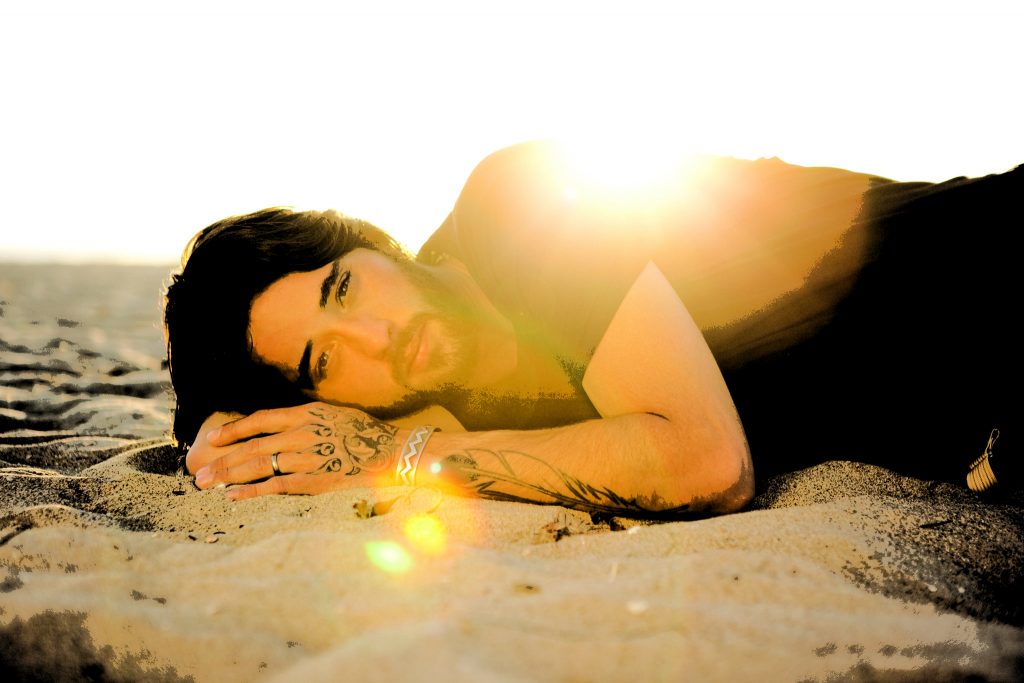
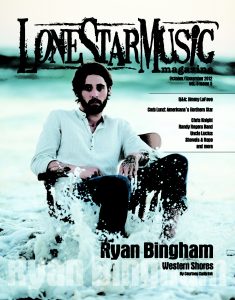
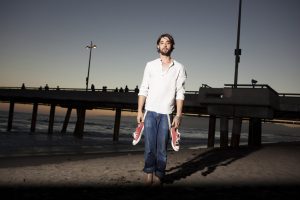

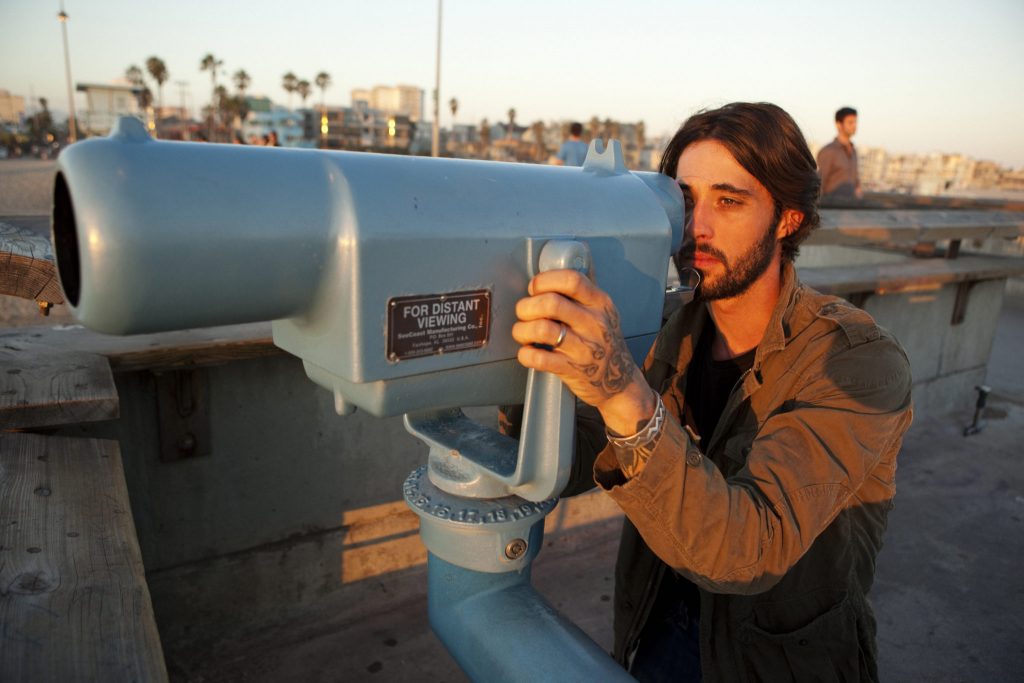
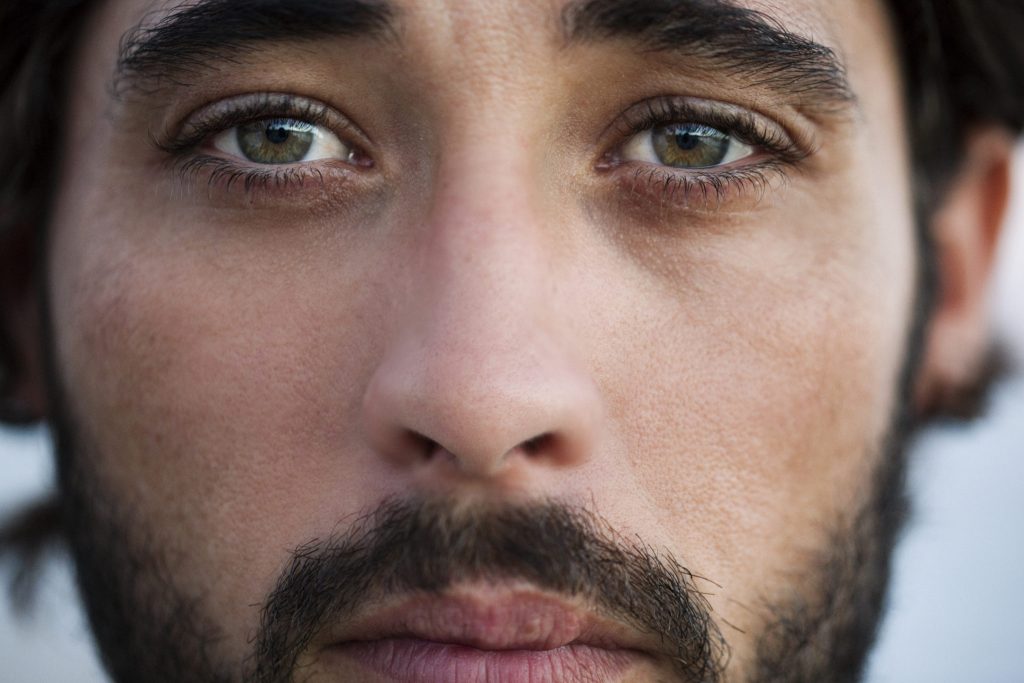
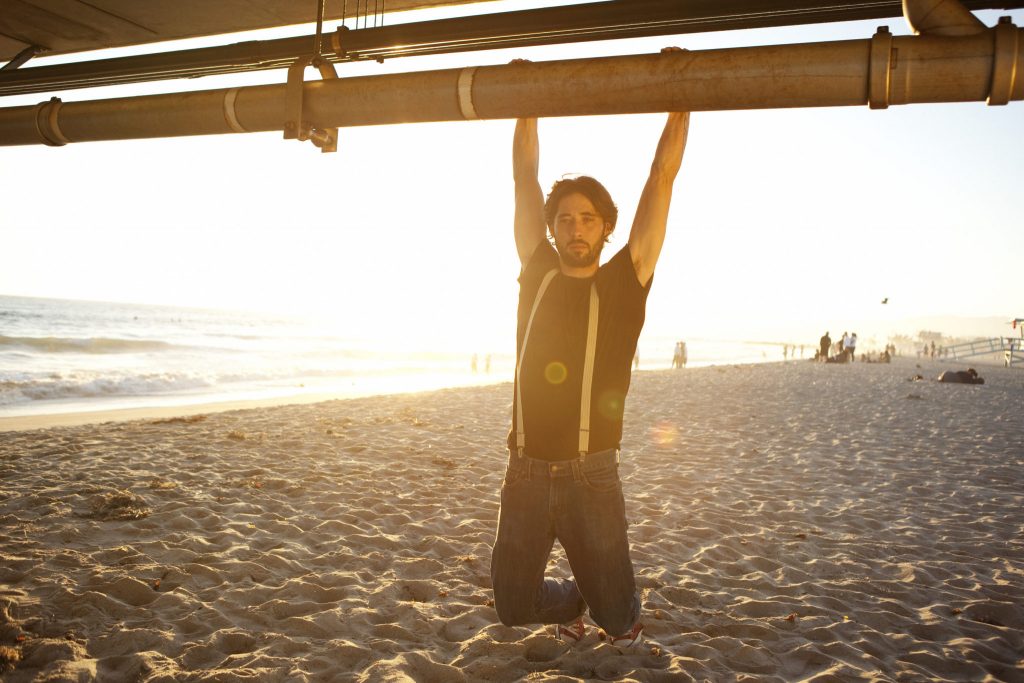
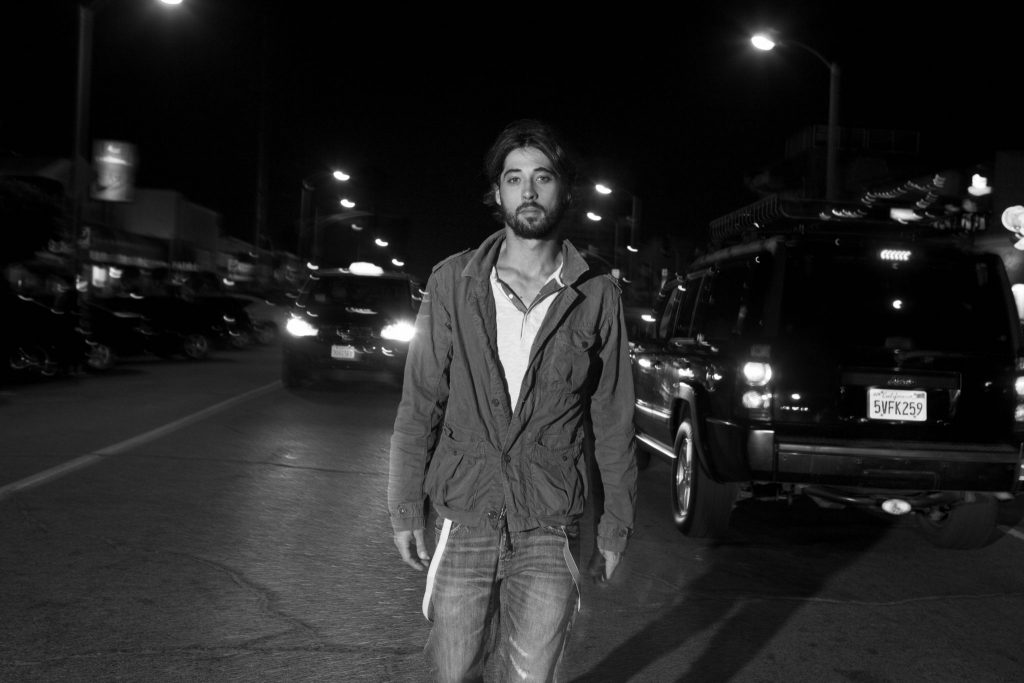

[…] August 2009. Their nuptials were officiated by Texas songwriter and visual artist Terry Allen, who read letters the couple had written to each other as their […]